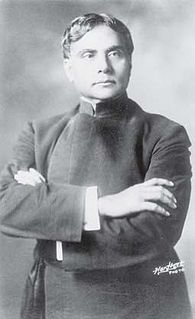A Quote by Taner Edis
When confronted with a demand that the universe have a cause, infidels have usually pointed out that God was not much of an explanation. This is true enough, but not really a positive argument. After mechanistic explanation became popular, infidels liked to restrict causality to the chain of causes in an eternal material universe, pointing out that no supernatural cause was then necessary. Plausible, but still rather defensive. Today's skeptic can do better. In all likelihood, the universe is uncaused. It is random. It just is.
Quote Topics
Related Quotes
Atheists themselves used to be very comfortable in maintaining that the universe is eternal and uncaused. The problem is that they can no longer hold that position because modern evidence that the universe started with the Big Bang. So they can't legitimately object when I make the same claim about God - he is eternal and he is uncaused.
Someone once said that if you sat a million monkeys at a million typewriters for a million years, one of them would eventually type out all of Hamlet by chance. But when we find the text of Hamlet, we don't wonder whether it came from chance and monkeys. Why then does the atheist use that incredibly improbable explanation for the universe? Clearly, because it is his only chance of remaining an atheist. At this point we need a psychological explanation of the atheist rather than a logical explanation of the universe.
Basically ... out of all the ridiculous religion stories which are greatly, wonderfully ridiculous—the silliest one I've ever heard is, 'Yeah ... there's this big giant universe and it's expanding, it's all gonna collapse on itself and we're all just here just 'cause ... just 'cause'. That, to me, is the most ridiculous explanation ever.
The universe shows us the life of God, or rather it is in itself the life of God. We behold in it his permanent action, the scene upon which his power is exercised, and in which all his attributes are reflected. God is not out of the universe any more than the universe is out of God. God is the principle, the universe is the consequence, but a necessary consequence, without which the principle would be inert, unfruitful, impossible to conceive.
The argument from design is ultimately an appeal to miraculous causes, i.e., causes that do not, and cannot, occur in the natural course of events. This is why an explanation via design is not a legitimate alternative to scientific and other naturalistic modes of explanation. To refer to a miraculous cause is to refer to something that is inherently unknowable, and this sanctuary of ignorance explains nothing at all. However much it may soothe the imagination of the ignorant, it does nothing to satisfy the understanding of a rational person.
It is my view that the simplest explanation is there is no God. No one created the universe and no one directs our fate. This leads me to a profound realization. There is probably no heaven, and no afterlife either. We have this one life to appreciate the grand design of the universe, and for that, I am extremely grateful.
The Universe was a silly place at best...but the least likely explanation for it was the no-explanation of random chance, the conceit that abstract somethings 'just happened' to be atoms that 'just happened' to get together in ways which 'just happened' to look like consistent laws and some configurations 'just happened' to possess self-awareness and that two 'just happened' to be the Man from Mars and a bald-headed old coot with Jubal inside.
If you have evidence that C1 is a cause of E, and no evidence as to whether C2 is also a cause of E, then C1 seems to be a better explanation of E than C1&C2 is, since C1 is more parsimonious. I call the version of Ockham's razor used here "the razor of silence." The better explanation of E is silent about C2; it does not deny that C2 was a cause. The problem changes if you consider two conjunctive hypotheses.
With the unknown, one is confronted with danger, discomfort, and care; the first instinct is to abolish these painful states. First principle: any explanation is better than none. . . . The causal instinct is thus conditional upon, and excited by, the feeling of fear. The "why?" shall, if at all possible, not give the cause for its own sake so much as for a particular kind of cause -- a cause that is comforting, liberating, and relieving.
The Christian claim is: Nothing explains the facts better than an all-powerful, all-knowing, omnipresent god creating the universe and sending Jesus to spread his message. This is about as remarkable a claim as could be stated, and yet it is tossed out lightly. Christians seem to imagine that "God did it" is as plausible as the natural explanation that stories grow with the retelling. The Christian has the burden of proof, and it's an enormous burden given this enormous claim.
No, no, it's not all random, if it really was all random, the universe would abandon us completely. and the universe doesn't. it takes care of its most fragile creations in ways we can't see. like with parents who adore you blindly. and a big sister who feels guilty for being human over you. and a little gravelly-voiced kid whose friends have left him over you. and even a pink-haired girl who carries your picture in her wallet. maybe it is a lottery, but the universe makes it all even out in the end. the universe takes care of all its birds.



































